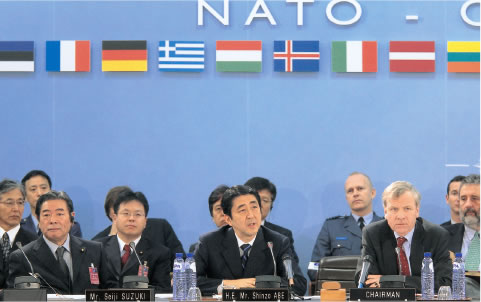D Europe
Japan and Europe are strategic partners based on fundamental values, aiming to create a free and prosperous world. As Japan engages in its new diplomatic policy of creating an “Arc of Freedom and Prosperity”, it is imperative that Japan-Europe relations in the international arena are strengthened further.
From this perspective, in January 2007 Prime Minister Abe visited the United Kingdom, Germany, Belgium, and France, having meetings with the heads of state of these countries and the president of the European Commission and also visiting NATO, which marked the first visit to NATO headquarters by a Japanese Prime Minister. In the same month, Foreign Minister Aso visited Romania, Bulgaria, Hungary and Slovakia, holding meetings with the heads of state, Foreign Ministers and others. in those countries. These visits fostered the sending of the clear message that Japan and Europe should cooperate in addressing international issues.
Ten countries acceded to the European Union (EU) in 2004, then Bulgaria and Romania in 2007, expanding the number of EU members to 27 countries. With a population of some 490 million people and a gross domestic product that now reaches US$13.6 trillion, the EU is expanding its influence on approaches to challenges facing international society. It is thus critical that Japan further enhance its relationships of cooperation and coordination with the EU as well as its bilateral relationships with individual European countries. Japan will reinforce its relationships with the major powers of Europe, notably the United Kingdom and France, which are permanent members of the United Nations Security Council, and also Germany and Italy, which are members of the G8. It will also create closer ties in the political and economic realms while undertaking deeper person-to-person and cultural exchanges with the countries of Central and Eastern Europe, whose economic importance has been increasing, and the countries of Western Europe, with whom Japan has already enjoyed cooperation in international society for some time.
Between Japan and the EU, political dialogues are held at various levels regarding issues they face in common. In April, the 15 th Japan-EU Summit was held in Tokyo, with Prime Minister Koizumi and Federal Chancellor of Austria Wolfgang Schussel (Austria having been president of the EU in the first term of 2006), in his capacity as President of the European Council, and President of the European Commission Jose Manuel Barroso in attendance. Prime Minister Koizumi raised three points for the enhancement of Japan-EU relations, namely (1) visible cooperation, (2) strengthening the strategic dialogue, and (3) the promotion of people-to-people exchanges, to which the EU leaders agreed. In addition, Prime Minister Koizumi once again expressed Japan's opposition to the lifting of the EU's arms embargo on China. Furthermore, the leaders agreed to launch a new strategic dialogue on Central Asia and also discussed the overall Japan-EU relationship, global challenges, and regional situations. In January 2007, Prime Minister Abe held discussions with President of the European Commission Barroso at EU headquarters, during which they shared the recognition that it is important for Japan and the EU to further enhance their relationship as strategic partners sharing fundamental values.

Prime Minister Abe addressing the North Atlantic Council (January 12, 2007, Brussel, Belgium; Photo: Cabinet Public Relations Office, Cabinet Secretariat)
Additionally, Japan maintained close contact with the business community through the Japan-EU Business Dialogue Round Table held in July while promoting the improvement of trade, investment, and business environments and making efforts in securing the interests of Japanese companies operating in EU member states through various meetings including the Japan-EU Regulatory Reform Dialogue meetings regularly held in March and November.
With regard to Japan's relationship with NATO, the relationship between the two is being strengthened as Japan and NATO both work to enhance their efforts for international peace and stability. The NATO Summit in Latvia held in November saw agreement among the heads of state that partnership with non-member nations, including Japan, should be intensified.
It was within this context that in May, Foreign Minister Aso became the first Japanese Foreign Minister to address the North Atlantic Council. In his speech, he stated that Japan and NATO have common values, and that while Japan has constitutional constraints, Japan wants to develop further its relationship with NATO for the peace and stability of international society. In addition, in January 2007, Prime Minister Abe attended and delivered an address to the North Atlantic Council as the first Japanese Prime Minister to do so, calling for a strengthening of Japan's cooperative relationship with NATO regarding efforts for peace and stability in Afghanistan and elsewhere, citing this as a new stage to which the Japan-NATO relationship should evolve. This was met with the support and the agreement of the Permanent Representatives to NATO.
As for Japan's relationship with the Organization for Security and Co-operation in Europe (OSCE), Secretary General Marc Perrin de Brichambaut visited Japan in January and exchanged views with Senior Vice Minister for Foreign Affairs Yasuhisa Shiozaki, during which they agreed to further strengthen the cooperative relationship between Japan and the OSCE.
With regard to its relations with the Council of Europe (CE), Japan is the only observer country from Asia, and Japan participates actively in the CE's meetings covering various fields. In 2006 Japan commemorated the tenth anniversary of its observer status. In order to celebrate this occasion and to illustrate Japan's cooperation in the preservation of cultural heritage as well as the contributions to intercultural dialogue resulting from this cooperation, a photographic panel exhibition was held at the headquarters of the CE in Strasbourg in October, which shows the world heritage that has been preserved or restored through the Japanese Trust Fund for the Preservation of the World Cultural Heritage in UNESCO.